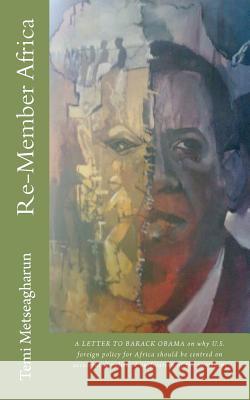Re-Member Africa: A LETTER TO BARACK OBAMA on why U.S. foreign policy for Africa should be centred on accelerated political unification » książka
Re-Member Africa: A LETTER TO BARACK OBAMA on why U.S. foreign policy for Africa should be centred on accelerated political unification
ISBN-13: 9781463720087 / Angielski / Miękka / 2011 / 114 str.
Re-Member Africa: A LETTER TO BARACK OBAMA on why U.S. foreign policy for Africa should be centred on accelerated political unification
ISBN-13: 9781463720087 / Angielski / Miękka / 2011 / 114 str.
(netto: 65,52 VAT: 5%)
Najniższa cena z 30 dni: 64,33 zł
ok. 13-18 dni roboczych
Dostawa przed świętami

Darmowa dostawa!
This book is an authentic voice of an African in the form of a personalised letter about Africa to Barack Obama, the current president of the United States of America. It is however designed for public consumption. Africa has numerous, challenging and intractable problems that are now the subject of public debate (the foreign aid-loving left versus the aid-bashing right) and not surprising, the topic of several best-selling books. The election of Barack Obama as the 44th president of the United States in 2008 raised the hopes of hundreds of millions of Africans and possibly billions of people all over the world for various reasons. Nowhere else than in Africa was the hope and sense of collective achievement so high because of the president's African heritage. The question now is this: In two and half years in Office, how has Barack Obama affected the continent of Africa? In the remaining 18 months of his first term what can Africans reasonably expect of him? Were they wrong to have had too much hope in what a he could do as the son of an indigenous African? Indeed, the U.S secretary of state Hilary Clinton, noted that the president is anxious to help the continent and was quoted as saying "U.S looking for New Course in Africa." Charting a new course for sustainable U.S. engagement with Africa is vital, Secretary Hillary Rodham Clinton tells U.S. envoys at the African Chiefs of Mission Conference. "What happens in Africa has a very direct and growing impact on what happens in Europe and what happens in the United States." There is only one course of action to chart in a most opportune time and presidency as the current one; and it is the long-awaited political unification of the continent says the book. If the U.S and the EU are to counter China's growing influence in Africa, and resolve some emigration issues, then, and indeed, the U.S and EU foreign policy for Africa should be re-orientated and centred on an accelerated political unification of the continent. Where Re-Member Africa, offers a superior analysis and deeper insight of the African problem is with regard to the personal history of the author and his knowledge and experience in dealing with the human mind (being a medical doctor and senior registrar in psychiatry). Indeed when readers understand "the African Mind" and the metaphorical schizophrenia of Africa's development, then they will have deeper insight into why aid has not worked so far and why political unification of the continent will amount to "re-membering" a dismembered continent as the solution to the economic and political woes of a continent and the cradle of human civilisation.











